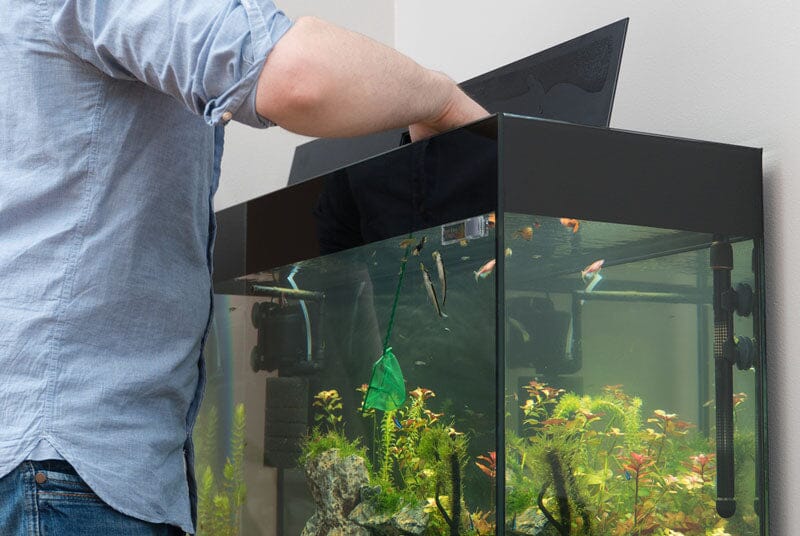Aquariums are wonderful additions to any living space, providing an intricate miniature ecosystem for aquatic enthusiasts. However, they require proper care and balance. Managing the algae in your tank is an important element of maintaining this equilibrium. Common algae eaters include plecos, Siamese algae eaters, otocinclus catfish, and Chinese algae eaters.
Unchecked, it can lead to several problems, affecting the health and aesthetics of your aquarium. Algae eaters can be your ultimate solution to this issue.
There are over 1,500 species of algae eaters, including fish, snails, and shrimp.
Understanding Aquarium Algae
Algae is a normal part of any aquarium ecosystem. However, different types of algae, including hair algae, cyanobacteria, and green spot algae, can overgrow, leading to unhealthy tank conditions.
Excessive light, overfeeding, and poor water conditions are major factors that contribute to algae overgrowth. It not only spoils your aquarium's beauty but can also harm aquatic life by depleting oxygen levels and releasing harmful substances.
Freshwater Algae Eaters
Freshwater Algae eaters, as their name suggests, feed on algae and help maintain a clean and healthy aquarium. They play an important role in your tank's ecosystem, reducing algae levels and contributing to the overall cleanliness and well-being of your aquarium's inhabitants.
Categories of Freshwater Algae Eaters
Algae eaters can be broadly categorized into fish, shrimp, and snails. Each category has its unique characteristics and benefits.

Detailed Analysis of Freshwater Algae Eaters
Different types of algae eaters have different dietary preferences and care requirements. Let's delve into a detailed analysis of each category.
Algae Eating Fish
Fish such as the Bristlenose Pleco, Otocinclus, and Siamese Algae Eater are excellent at controlling algae. They thrive in community tanks and actively clean your aquarium throughout the day.
Algae Eating Shrimp
Freshwater shrimp like the Amano Shrimp and Cherry Shrimp are popular choices. They're small, peaceful, and efficient algae eaters that also consume uneaten food and decaying plant matter.
Algae Eating Snails
Nerite snails, Mystery Snails, and Malaysian Trumpet Snails are known for their algae-eating capabilities. These snails are easy to care for and are great at reaching spots that fish and shrimp can't.
Choosing the Right Algae Eaters for Your Aquarium
Factors like the size of your tank, the type of algae present, and compatibility with other species are essential to consider when choosing the right algae eater for your aquarium.
Care and Maintenance of Algae Eaters
While algae eaters are known to help keep tanks clean, they require a balanced diet beyond just algae. Some may require supplemental feeding. Ensuring optimal water conditions and monitoring for common health issues are essential for the care of your algae eaters.
Common Mistakes to Avoid with Freshwater Algae Eaters
Avoid overstocking your tank with algae eaters, as this can lead to stress and competition for resources. Also, not all species are compatible with each other or with other fish species. Finally, overfeeding or underfeeding can lead to health issues and, paradoxically, can promote algae growth.
The Impact of Algae Eaters in Ponds
While the primary focus of this article has been aquariums, it's worth noting that algae eaters also play a significant role in maintaining balance in outdoor ponds. Just like in aquariums, algae eaters control the algae population and help keep the pond water clean and clear. The presence of these animals also benefits other pond inhabitants by preventing the overgrowth of algae that can deplete oxygen levels and lead to poor living conditions.

Interactions with Other Pond Life
The addition of algae eaters in ponds contributes to a healthy ecosystem by fostering positive interactions with plants and other animals. Plants thrive better in a controlled algae environment, which in turn supports a diverse range of other pond life. These algae eaters also help in waste management as they consume the detritus that other animals produce.
The Role of Algae Eaters in a Freshwater Aquarium
Returning to the context of a freshwater aquarium, the substrate or the bottom layer of the aquarium plays a significant role in algae growth.
Brown algae are especially common in newer aquariums with excess nutrients in the substrate. Algae eaters like certain snails and shrimp are excellent at consuming this type of algae.
Green algae is another common type found in aquariums that can coat tank walls, substrate, and plants. Many types of algae-eating fish are proficient in controlling this type of algae, providing an essential service in maintaining the aesthetic appeal and health of your fish tank.
Factors Contributing to Algae Growth
Overfeeding fish is a common mistake that leads to unnecessary waste, which can eventually break down into nutrients that promote algae growth. By providing an appropriate amount of fish food, you can keep your aquarium's nutrient levels balanced and algae growth in check.
Conclusion
In conclusion, while freshwater algae eaters are a fantastic tool in the fight against unwanted algae growth, maintaining a healthy, balanced aquarium requires a comprehensive care plan that addresses all aspects of your tank's environment.
Remember, an aquarium is a carefully balanced ecosystem that depends on the interplay of multiple factors. Introducing algae eaters into your tank can be a major step in maintaining this balance. But, like any other aquarium inhabitant, they require proper care and attention. With this knowledge, you can ensure that your aquarium remains a vibrant, clean, and healthy environment for all its inhabitants.
Frequently Asked Questions
What role do algae eaters play in maintaining a freshwater aquarium or pond?
Algae eaters help control the growth of algae, contribute to waste management, and create a balanced environment for other aquatic inhabitants in both freshwater aquariums and ponds.
How do algae eaters interact with other aquatic life in a freshwater aquarium or pond?
Algae eaters contribute positively to the ecosystem by consuming algae and detritus, thereby preventing excessive algae growth and providing a healthier environment for plants and other aquatic animals.
Can algae eaters entirely prevent algae growth in my aquarium or pond?
While algae eaters significantly help control algae growth, they are not a substitute for good aquatic management practices such as proper feeding, regular cleaning, and maintaining optimal water conditions.





